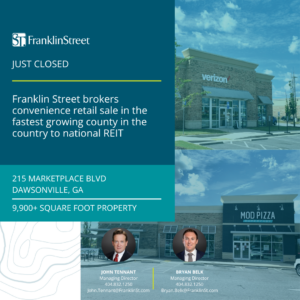ATLANTA—Over the past five years, the specialty grocery industry has grown steadily as rising disposable income levels and higher consumer spending have driven overall economic recovery. That’s according to research from IBIS World.
In the coming years, the industry is expected to continue expanding steadily. In fact, during the next five years as economic conditions improve and a greater share of Americans develop a taste for specialty, premium or all-natural foods, IBIS is reporting 3.6 percent annual growth over the next 10 to 15 years.
GlobeSt.com caught up with Bryan Belk, senior director of Franklin Street, to get his thoughts on the commercial real estate impacts of the market. He talked to us about the latest trends, site types and more in part one of this exclusive interview.
GlobeSt.com: What are the latest trends in the specialty grocery market as it relates to commercial real estate?
Belk: The biggest trend we are seeing is that specialty grocers are being the catalyst for new in-town developments in major cities across the Southeast. Generally, when you are seeing site plans for major mixed-use developments these days it includes a Whole Foods, Sprouts, or another attractive grocer anchor.
GlobeSt.com: What types of sites do these specialty grocers prefer?
Belk: The products in these stores are typically higher-end, so we tend to see the locations in the most attractive demographics with the higher incomes and higher college educated populations. Because of their varying footprints, these tenants are able to get into a lot of spaces their competitors cannot. We are not seeing a lot of Publix’s smaller than their traditional 45,000-square-foot box and Kroger is expanding on their more than 100,000-square-foot locations.
GlobeSt.com: Most of the developers are private at this point. Do you expect more action from the REITs?
Belk: No, I expect the growth to continue to be led by the private developers because they are a little more nimble. REIT development in this sector is more frequently re-development of older boxes into specialty grocers. A good example of this is Weingarten’s recent re-tenant of a Staples box with Fresh Market in Roswell, Georgia.



